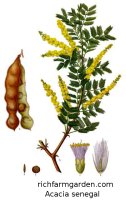
Tender trees and shrubs with ornamental foliage and blooms belonging to the pea family, Leguminosae. Grown in warm climates or in greenhouses in cooler ones. There are about 400 varieties of acacia and are chiefly native to Australia.
Some acacias provide valuable timber, others have tannins in the wood or perfumes from the blooms. Wood is hard and durable and is used for tool handles, turnery and furniture. Acacia gums are used in dyes and in print inks and as a basis for mucilage. The blooms are edible and contain a large amount of pollen. They are also excellent trees for land reclamation where the climate permits.
(Plant heights are given at maturity)
Blue Leafed Wattle (Orange Wattle) - Acacia
saligna - Extremely rugged
tree, well adapted to barren slopes and rocky, non-productive
ground. Fast growing, it can reach a height of 30ft.
Native to southwestern Australia, it is adaptable to a wide range of
soils. Hardy to 20F
(-6.6C ); height: 30ft
| #3403 Packet $7.99 Approximately 50 seeds | ADD TO ORDER |
Cootamunda Wattle (Golden Mimosa) - Acacia
baileyana - A truly
spectacular small tree with feathery foliage and gorgeous masses of
fragrant yellow
blooms in early spring. Growth habit is rounded and arching to
the
ground. Tolerant of a wide range of conditions. Endangered
in
its native New South Wales, it has been maintained through
cultivation.
Does well as a potted plant. Hardy to 20F
(-12.2C); height:
30ft.
| 1550 Packet $10.95 Approximately 100 seeds | ADD TO ORDER |
Silver Wattle - Acacia dealbata -
Native southeastern Australian shrub
prized for its fragrant yellow blooms. Leathery foliage is
silver-green in color. Grows quickly and is one of the hardiest
of the acacias. Hardy to 10F (-17.7C); height: 100ft.
| 1552 Packet $10.95 Approximately 100 seeds | ADD TO ORDER |
| #B1lb-4202 Gum arabic dried powder 1lb $27.99 | ADD TO ORDER |
| GROWING INSTRUCTIONS FOR ACACIA SPECIES |  |
Acacias can be propagated from seed sown in spring and summer. The seeds are hard and must be scarified (scratched or chipped) and soaked in warm water for 24 hours prior to planting. Sow them 1/2 inch deep in pots or trays filled with a sterile potting medium or equal parts of peat moss and sand. Cover with glass or plastic to hold in the moisture. When the seedlings appear, remove the cover and allow them to grow on until they reach about 2 inches in height. They can then be repotted in 3 inch pots in equal parts sandy loam and peat. Cuttings can be taken from soft wood in early summer. Tear off small side shoots with a heel attached, then insert them into coarse sand or a mix of sand and peat and mist frequently. When rooted, misting should be reduced and the cuttings allowed to grow by potting in small pots. Young seedlings of 4 inches should be cut back to 3 inches tall and side shoots must be cut as well to create a fully branched tree.
Order Early
See TERMS